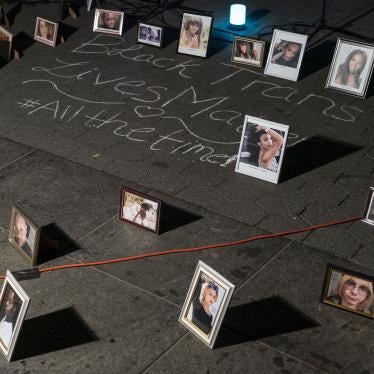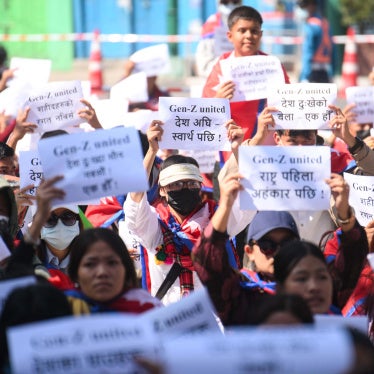In the wake of a historic court decision last week barring discrimination based on sexual orientation in civil marriage, the state of Massachusetts should not create separate but unequal “civil unions” for same-sex couples, Human Rights Watch said today. Massachusetts’s legislators should abide by the state Supreme Judicial Court’s ruling and amend the state’s marriage-licensing law to ensure equal access to civil marriage.
“The Massachusetts court has clearly said that same-sex partners should have the same right to marry as heterosexual couples,” said Kenneth Roth, executive director of Human Rights Watch. “Any couple should be free to demonstrate their love and commitment to each other through marriage. The state should not discriminate in this deeply personal area because of the partners’ gender or sexual orientation.”
On November 18, the state’s highest court ordered in Goodridge et. al. v Department of Public Health that gay and lesbian couples be admitted to the full rights of civil marriage. The court gave the state legislature six months to amend laws to conform with the decision. Since then, several prominent state officials—including Governor Mitt Romney, Attorney General Thomas Reilly, and Speaker of the House of Representatives Thomas Finneran—have suggested that the legislature create special “civil unions” for gay and lesbian couples. These “civil unions” would provide some of the rights of marriage, but would create a separate but unequal system that would fail to meet the court’s stipulation.
“History shows again and again that separate is never equal,” said Roth. “Civil unions rarely if ever offer the full roster of rights that marriage entails. And they stigmatize same-sex relationships by suggesting they deserve only second-class recognition.”
In a September 4 briefing paper (https://www.hrw.org/backgrounder/lgbt/civil-marriage.htm) on equality in civil marriage, Human Rights Watch noted that civil unions have represented progress—but insufficient progress. Civil unions do not carry the same promises of recognition across international borders that marriage ordinarily implies. The burden is on governments to justify the denial of recognition to foreign marriages, but the burden usually—and unfairly—rests on partners in civil unions to justify their recognition abroad.
In Massachusetts, the Goodridge decision listed, “with no attempt to be comprehensive,” 21 different laws conferring 16 different benefits on married couples in relation to property rights alone.
“There is no guarantee that civil unions will offer equality in all the benefits of marriage,” Roth said. “The simplest and fairest solution is to open the status of civil marriage to same-sex couples, and end all these inequalities with one stroke of a pen.”
Governor Romney and other state officials have also called for an amendment to the Massachusetts state constitution to define marriage as the union of a man and a woman. Other politicians have advocated a similar amendment to the U.S. Constitution.
“Constitutions should protect people from prejudice, not enshrine inequality,” said Roth.
The Goodridge decision took pains to distinguish civil marriage, which it called a “wholly secular institution,” from the marriage practices or beliefs of religious groups. In its briefing paper, Human Rights Watch observed that civil laws on marriage can be changed to end discrimination based on sexual orientation without violating the prerogatives of religions to their own rules and practices. However, so long as the state retains marriage as a marker of legal recognition of relationships, it should be governed by international protections for equality and against discrimination.
Equality under law and protection against discrimination are basic principles of international human rights, as well as of civil rights in the United States. Numerous international bodies have affirmed that sexual orientation is a protected status. The United Nations Human Rights Committee held in 1994 that the prohibition of discrimination in the International Covenant on Civil and Political Rights (ICCPR) should be understood to include sexual orientation. The United States ratified the ICCPR in 1992.
For more information on court decisions affecting the lives of lesbian, gay, bisexual, and transgender people around the globe, see Human Rights Watch's "Resource Library for International Jurisprudence on Sexual Orientation and Gender Identity" at https://www.hrw.org/lgbt/jurisprudence.htm.
For more information on the legal aspects of civil marriage, please see the Human Rights Watch briefing paper: Non-Discrimination in Civil Marriage: Perspectives from International Human Rights Law and Practice at https://www.hrw.org/backgrounder/lgbt/civil-marriage.htm.








